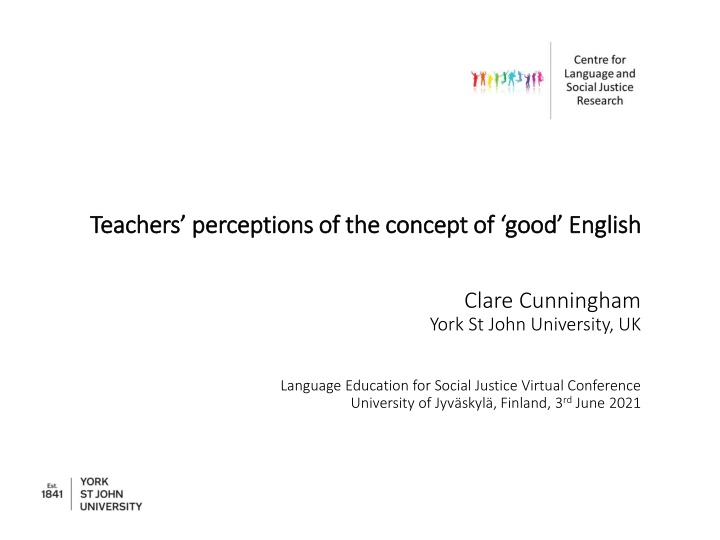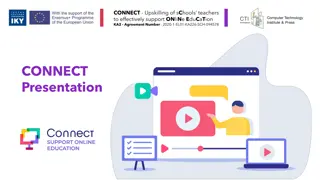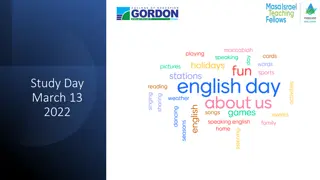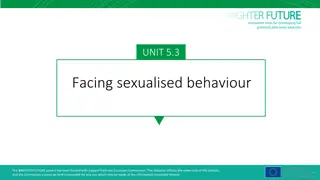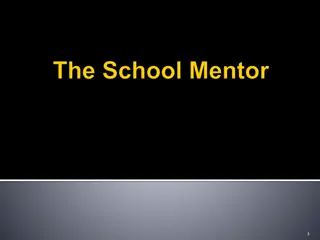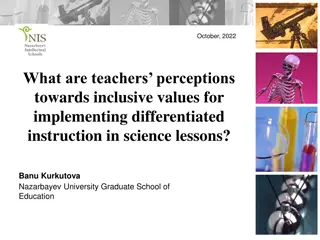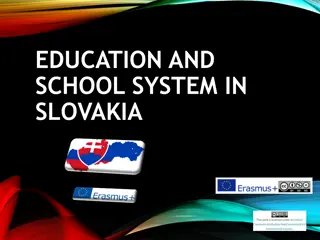Teachers' Perceptions of Good English in Schools
Ill-defined notions and language policing influence teachers' perceptions of good English, impacting students' language learning experiences. Research explores attitudes towards standard and non-standard English varieties in educational contexts.
Download Presentation

Please find below an Image/Link to download the presentation.
The content on the website is provided AS IS for your information and personal use only. It may not be sold, licensed, or shared on other websites without obtaining consent from the author.If you encounter any issues during the download, it is possible that the publisher has removed the file from their server.
You are allowed to download the files provided on this website for personal or commercial use, subject to the condition that they are used lawfully. All files are the property of their respective owners.
The content on the website is provided AS IS for your information and personal use only. It may not be sold, licensed, or shared on other websites without obtaining consent from the author.
E N D
Presentation Transcript
Teachers perceptions of the concept of good English Teachers perceptions of the concept of good English Clare Cunningham York St John University, UK Language Education for Social Justice Virtual Conference University of Jyva skyla , Finland, 3rdJune 2021
Outline Background Building on Grainger and Jones s work here - standard and good English in schools and society Research with teachers on exploring these concepts Research context and design Analysis - a strong awareness of different: Perspectives Purposes Elements Cohorts Conclusions and implications
Background: ill-defined notions Standard English is ill-defined in the National Curriculum documents So successful has been the rise of standardised English that everyday users themselves are not aware that its history is a human-made one standardised English is an extremely effective tool for, at worst, subverting the rights of others who do not adhere to the ritual [the accepted patterns of linguistic behaviour]. Peterson, E. (2020)
Background: language policing increases linguistic conservatism non-standardised forms banned Cushing (2020) metaphors of crime, and often using language as a proxy for social factors such as academic achievement, employability, and standards Cushing (2020) If you allow standards to slip to the stage where good English is no better than bad English, people turn up filthy at school . . . all these things tend to cause people to have no standards at all, and once you lose standards there's no imperative to stay out of crime (Tebbit, 1985)
Background: language policing increases cheerleading the little successes for EAL students the kindness masks a pervasive deficit model Cunningham (2020) children who are more socially disadvantaged are often constructed more negatively than those who are classified as EAL Cunningham (2020)
Research on perceptions of good English Discussing attitudes and perceptions of good English research found in the ESL and EFL disciplines (e.g. Karakas, 2017) Discrimination against varieties considered in the research literature (e.g. Cushing, 2020, Grainger (2013), Peterson (2020) Very rarely have mainstream classroom teachers been asked how they conceive of this concept
Research context and design Semi-structured interviews with 40 primary and pre-primary school teachers across England, from a good range of settings: rural to urban, high SES to low SES, highly diverse and homogeneous Part of a larger, international project considering ABK towards multilingualism using shared interview guide Questionnaire item of concern: 1. What does the term good English mean to you? Extracting all relevant extracts from the broader data set = c. 21,000 words Transcripts were analysed through an iterative inductive approach to build a framework to apply to the rest of the data set* (purposively broad in the asking interested in the full group of students) *with acknowledgements and thanks to Emily Lightwood (RA) for her work on this
Inductive analysis: key themes Participants were often very quick to move away from the ill-defined and SATS focused views of good or standard English to something much more usage-based and holistic Key themes for further analysis and discussion, therefore, are: Perspectives Purposes Elements Cohorts
Different perspectives Institutional Expectations, standards, curriculum Teachers: personal Communicate, get by, read it, speak it, creativity Parents Expectations, anxieties, capacity to support Employers Interviews, getting a job
Different perspectives Institutional Expectations, standards, curriculum Teachers are put under lots of pressure by the expectation that all children should have the same targets. They know it is impossible for all pupils to have same targets because of cognitive ability and external circumstances, e.g. home life for you to be good at English (.) you would be achieving um (.) what s it called now (.) greater depth at year six level (.) spelling, grammar, punctuation matter for any kind of standardised testing Backwards , unrealistic , ridiculous
Different perspectives Institutional Expectations, standards, curriculum Erm I think that some staff are better at it than others () I know that b I think maybe myself and my w- the my w the colleague from south africa we can re- we re like grammar nazis We really push on it and we really shove it and we really go as far as we can because of the nature of the testing at the end Part of good English is meeting the government expectations for end of yr 6: age-related expectations in writing: (.) and age-related expectations in spelling (.) grammar (.) punctuation. Aim to get them as close to the goal as possible for them, so they reach it sooner post-primary school high expectations
Different perspectives Institutional Expectations, standards, curriculum Teachers: personal Communicate, get by, creativity (conflicted/ contradictory) Conflicted as to whether being able to communicate takes priority, or whether it is only 'good' English if grammar etc. are correct: you know we get by on so much communication particularly (.) text speak and things like this nowadays where you can still be understood (.) but as an english graduate im still thinking you know come on! (.) verb tenses ________________________________________ but at the same point maybe its all for nothing because if we can all understand each other (.) thats at the [...] of the matter From a personal POV, good English is understanding others, being understood and being able to communicate. Contrasts with school's POV which is much more grammar-based and about standardisation
Different perspectives Institutional Expectations, standards, curriculum Teachers: personal Communicate, get by, read it, speak it, creativity Parents Expectations, anxieties, capacity to support Parents' habits can influence their children's use of English: Parents in the area of the school tend to be quite young, some don't come from backgrounds where education is valued as a priority: the problem that we have with a lot of the () e english as a first language for parents is that the English that they teach their children is absolutely atrocious we: finished the PE lesson little bit early (.) an:d seven or eight minutes so I said to one of our boys who d been at the school for a while (.) go pick your favourite book and we ll do a little story before we finish (.) and he came and picked the Gruffalo (.) and every kid who d been in our school from F1 went yes:: Gruffalo (.) and (.) almost every kid who hadn t been through our foundation stage didn t have a clue what it was (.) Worried about levels and standards
Different perspectives Institutional Expectations, standards, curriculum Teachers: personal Communicate, get by, read it, speak it, creativity Parents Expectations, anxieties, capacity to support Employers Interviews, getting a job Jobs and employment: Seems less important than you might think to teachers. Only mentioned by 5 participants and in the context of job interviews, not the English pupils might need to actually do the jobs.
Different purposes Socialising Colloquial language, slang Getting your point across Being understood, survival level Contextually-appropriate To know how and when to use SE, What you are supposed to say , swearing, understanding formality teachers have a duty to teach children when to use standard English Having knowledge of colloquial language, slang- makes 'good English' different now to what it previously was
Different elements Written Express yourself, interesting, independence Comprehension Key aspect, access to curriculum, can t teach this Grammar and punctation (SPAG) Accuracy, the basics Reading Fundamental, basic skills, big impact of everything English doesn't have to be perfect, just so long as it can be understood, people know what you need or want and what you're trying to say I cant bear it when people you know forget their apostrophes and put them in the wrong place and use the wrong there their and they re and everything like that - writing can be used to show educational status personally I m a perfectionist and I like things to be correct and if I can see that its wrong its it s wrong and it needs sorting
Different cohorts Regional variation Humorous, divisive, accent OK but dialect not White British/ native-speakers Different expectations on native speakers EAL Lower expectations, impressive progress, home language challenge Summer born Statistically
Different cohorts Regional variation Humorous, divisive, accent OK but dialect not Children who move from more affluent parts of the county adapt their version of English to match the children already at the school, which makes it 'worse': I think sadly sometimes you do see that we have these children who turn up to us who are fabulous: (.) and then they start adapting to the way our kids are ((through laughter)) and they start change- and it s real (.) you see it (.) you see them start to cha:nge (.) to more like our kids and it s terrible to say that cos I love our kids but (.) er: they re an interesting bunch like an it (.) you almost sometimes want to say to these parents when they turn up (.) really? it was trendy a few years ago to well you have to accept children's different dialects but doing no favours to job interviews. allowing children to speak with their own dialect isn't 'helpful' for them yeah I have this conversation with my wife a lot because she s from Northern Ireland (.) and I m from Kent so there s a very much er (.) a divide there so I- I- I speak with good English and she doesn t 'breaking them out of their dialect'
Different cohorts Regional variation Humorous, divisive, accent OK but dialect not White British/ native-speakers Different expectations on native speakers Difference in definition of good English depending on who the speaker is and whether English is their first language or not : her English is so poor and I ve said to her for a girl whose for someone s who is brought up in this country and speaks English as a first language to be as ta- speak English as poorly as she does do is completely unacceptable then I know that she cant she can only go by what she s being modelled at home and you know its that bad habits are hard to undo _____________________________________ - Mentions that EAL pupils speak better English than children whose first language is English - 'butchering' the language : if there s one thing that s extremely annoying about children as a first language is how they ruin it the number of times I have heard can I go toilet come out of the year six child s mouth who the four year six children who have got all English as a first language can I go toilet we was doing this I done my homework they absolutely its they absolutely butcher the language it s the it s the English as a first language who are just who are worse at it than the EALs
Different cohorts Regional variation Humorous, divisive, accent OK but dialect not White British/ native-speakers Different expectations on native speakers EAL Lower expectations, impressive progress, home language challenge Summer born Statistically children who come in with no English at least if we could get them up to a standard where at least they could go out into the wo:rld and they could (.) look after themselves (.) go shopping do all the things that they need to do (.) read what they need to do (.) basic literacy really I think that s what (.) you know we need to aim at that for everybody _______________________________________________it s really difficult (.) because the parents speak (.) their own language at home T: so: (.) and a lot of the parents don t have a lot of English either so it is like a (.) you know an alien environment when they come in Most parents are supportive but home language
Conclusions Teachers conceptualise the notion good English in conflicting and inconsistent ways Overall, however, many apply a much more holistic pragmatic view than they find in the school curricula and policy documents This leads them to find the teaching stipulations frustrating and expectations on children unfair HOWEVER: distinctly different expectations for native and EAL groups in schools problematic for both groups and very much a social justice issue
Implications Cause for celebration that so many teachers are resisting the top-down narrative of an ill-defined notion of standard English in the curriculum and policy documents But how do those teachers become equipped to know that so many others agree and start to work from the grass roots against the pressures being applied from so many directions? Shifting perspectives on expectations seems an important next step Thank you for listening questions welcome!
References Baratta, A. (2018). Accent and Teacher Identity in Britain. Bloomsbury Cunningham, C. (2020). Beliefs about good English in schools. In Hall, C. J. and Wicaksono, R. (eds), Ontologies of English. Conceptualising the language for learning, teaching, and assessment (pp. 142-162). Cambridge: Cambridge University Press. Cushing, I. (2020). The policy and policing of language in schools. Language in Society, 49(3), 425- 450. doi:10.1017/S0047404519000848 Grainger, K. (2013). "The daily grunt": middle class bias and vested interests in the 'Getting in Early' and 'Why Can't They Read?' reports. Language and Education, 27 (2), 99-109. Karaka , A . (2017). Students perceptions of Good English and the underlying ideologies behind their perceptions . Journal of Language and Linguistic Studies , 13 (2) , 487-509 . Retrieved from https://dergipark.org.tr/en/pub/jlls/issue/36120/405623 Lippi-Green, R. (2012). English with an Accent: Language, Ideology and Discrimination in the United States (2nd edn). London: Routledge. Milroy, J. and Milroy, L. (2012). Authority in language: Investigating standard English (3rd edn). London and New York: Routledge. Peterson, E. (2020). Making sense of Bad English . Routledge.
